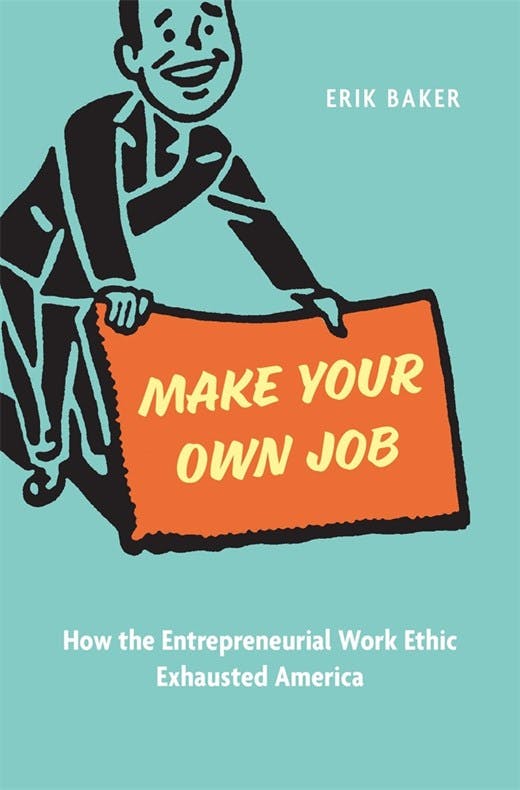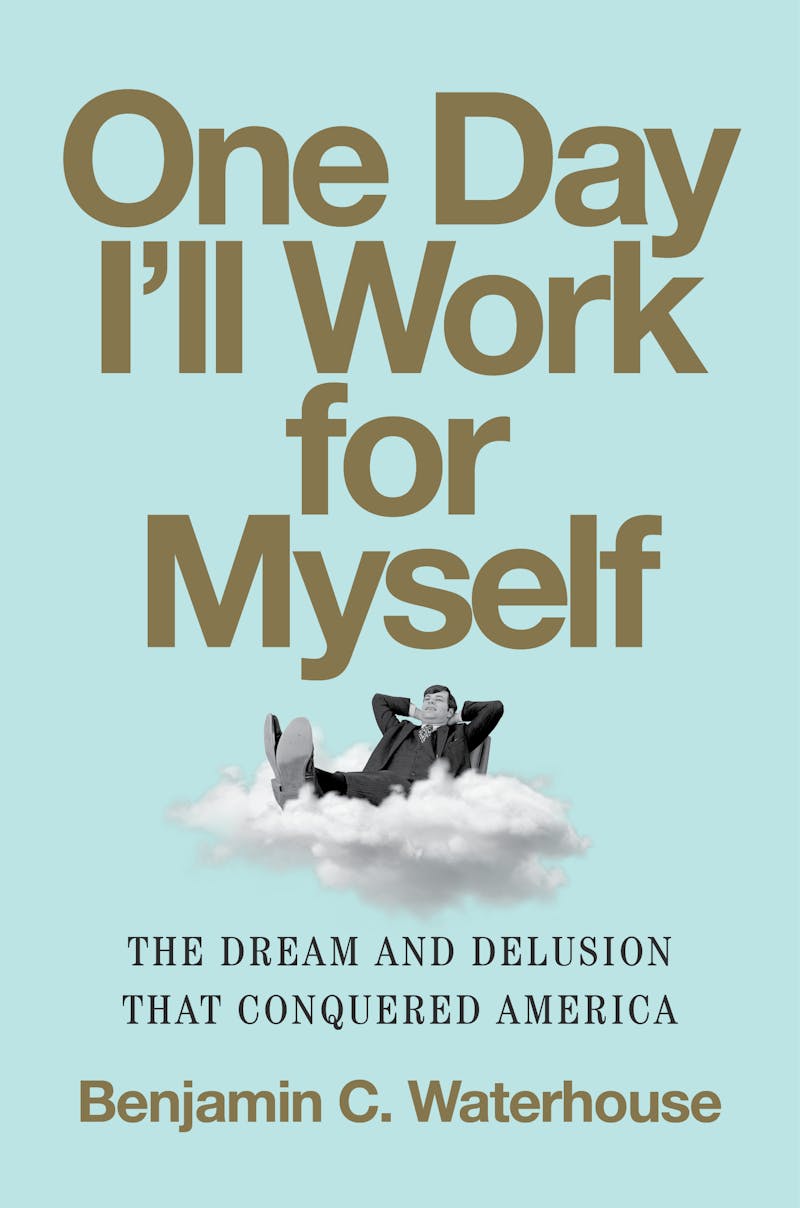Three cheers for the entrepreneur! Three cheers for that swashbuckling master of society’s rocky, reef strewn seas! They are the best! They are good vibes! And who are “they,” you ask so skeptically?
The entrepreneur is a small-business owner, a David to the Goliath of corporate conformity. He is also an incredibly wealthy business founder who presides over a massive, nonunionized workforce and is something of a Goliath himself. Three cheers for both David and Goliath! Ray Kroc and Sam Walton: definitely entrepreneurs. Their employees: not. But someone can be an entrepreneur while also being an employee, working at a huge company. This is getting confusing. Entrepreneurs make their own work, love their jobs, and never complain. Because they can’t! Because they are self-employed and/or their own boss. Three cheers for the entrepreneur who is an individual above all else, with no connection to any other person beyond the money that can be extracted from them!

Now that I consider it, I’m not sure what exactly an entrepreneur is. Is it just someone who starts a business? But why is starting a business good, when we don’t know what kind of businesses are being started? Conservatives surely don’t want more abortion access startups, and liberals wouldn’t rally behind a new gun manufacturer. The term is mind-bogglingly inclusive, as the historian Erik Baker notes in his new book, Make Your Own Job: How the Entrepreneurial Work Ethic Exhausted America, which chronicles the creation and ascendance of the idea of entrepreneur from the end of the nineteenth century until today, through the writings of popular psychologists, self-help authors, and management theorists. “Our image of ‘the entrepreneur,’” Baker writes, is “dominated by two antipodal figures: the tech billionaire and the gig worker using that billionaire’s app to scrape out an income.” When both the ruler and ruled are entrepreneurs, what could it possibly mean? We live in a time in which all our lives are dominated by massively powerful monopoly corporations, and yet we focus on a mythical, marginal figure.

The triumphalism of the entrepreneur reached a fever pitch in the period following the Great Recession. The entrepreneur was valorized everywhere, accepted as a universal good, touted by extreme conservative business leaders and social democrats alike. Thousands of business school courses on entrepreneurship are taught by scores of endowed chairs. But why? What is so special about entrepreneurialism and small business? Two new books show how the celebration of small business and the entrepreneur has recurred in American history, emerging out of crises, playing to vague notions of democratic ideals and diverting attention from those who caused these crises in the first place.
When the founders of the United States got together to draft their framework for a government, industrial production—large factories churning out goods with large workforces tending machinery—only existed at the margins. The country was an agrarian economy with small cities and a high degree of self-employment. Firms were generally small, and even by 1850 the average employer had only about eight employees. (Though rare, large employers like the New England cotton producer Pacific Mills had thousands of workers.)
And so it was that the rise of the industrial economy after the Civil War caused a major existential crisis for the young nation. With the new machines and mass production, firms got bigger, self-employment declined, and an increasing number of people worked for a wage. For the first time, the nation was no longer a society of farmers and small businesses. But the country had been founded on a vision of autonomy that rested on Thomas Jefferson’s cherished idea of the “yeoman farmer.”
The rapid increase in industrial production in the nineteenth century was fed by the twin rise of finance and monopoly businesses, which accelerated the boom-and-bust cycle of the economy as money rushed into and out of sectors and firms. Regularly, the economy would crash, and there were many financial crises between 1873 and 1920. Working people’s hours and income fluctuate wildly as firms try to cut costs during lean time and raise employment in fat ones. Layoffs and wage cuts rained down on workers who had little control over job conditions. Industrialization, that is, invented mass unemployment and instantiated it as a seemingly permanent facet of American life. As Baker points out, the word “unemployment” first appeared in print in 1887.
So how did America react to the rolling crises of financial crashes and mass unemployment? Some workers rushed into unions, like the Knights of Labor, that insisted on formalizing and smoothing out these cycles by getting firms to agree to basic wages, regular hours, and constraints on the bosses’ ability to hire and fire willy-nilly. Workers argued that companies should not be able to callously speculate with the futures of their workers’ lives. They demanded more structure and less chaos.
But into the chaos of working-class life rushed self-help gurus who admonished working people to abandon the hope of ever taming the corporate leviathans and to go to work for themselves. They suggested that instead of confronting this massive shift in American life, people just ignore it. Writers like Orison Swett Marden, a “bald, mustachioed hotel magnate,” as Baker has it, told his audience that they should pretend to be participating in an open market for their time and effort (even though, he never mentioned, they were legally subordinated to their bosses). “Get this idea that you are an employee out of your head,” he wrote. “You are in business for yourself, selling your skill to your employer.” Technically, the workers were not in business for themselves, but this didn’t matter. This idea provided guidance for the masses of people struggling to understand how they should operate in a society in which their employers, on which their livelihoods depended, didn’t seem to care much about them.
Marden founded Success magazine in 1897, a publication that encouraged workers to “make their own job” and “work for a business as if it were your own.” The latter is an idea that corporate types to this day advise each other over coffee. I heard one man giving a younger man this very advice last month in a Manhattan coffee shop.
Marden’s advice was part of an intellectual movement called New Thought, which varied in its texture and application, but was a self-help ideology that suggested creativity and happiness could be found even among the grinding realities of the assembly line. It was almost tailor-made for the people who instituted this system—like Henry Ford, who had boiled jobs down from complex craft to repetitive tasks so routine and dull they drove workers crazy, such as tightening the same three bolts on chassis all day as they rolled by on the line. And yet Ford was a big proponent of New Thought and claimed that, as a society, “We have limited the creative faculty too much and have used it for too trivial ends.” This elided the fact that he himself had limited the creativity of work so dramatically that it was essentially outlawed in his factories.
These ideas were backed by scientists like Harvard psychologist Hugo Münsterberg, who believed working-class discontent stemmed not from the social and economic conditions brought about by extreme employer power, but from the faulty minds of the workers themselves: “The feeling of monotony depends much less upon the particular kind of work than upon the special disposition of the individual,” he wrote in 1913. New Thought said: If you find work boring, terrible, and scarce, you can change it by changing your attitude! “This advice celebrated the value of innovation while also reassuring those who found stimulating work hard to come by—a welcome message for Henry Ford as well as for those struggling to figure out how to make a life in the world he was reshaping,” Baker writes.
Crisis struck again. When the financial crash of 1929 hit, ripping open the gates for the Great Depression to spill out and drown the nation in unemployment, Marden’s message was ready to be updated. Popular psychologists and success writers like Dale Carnegie, Napoleon Hill, and Norman Vincent Peale rushed in with tracts about how enterprising people could find happiness and wealth among devastation just by going into business on their own. One popular book encouraged people to rescue themselves from unemployment by taking up odd jobs, suggesting they could find stability by “making bird houses, reading tea leaves, performing genealogical research, knitting cozies for baby bottles, and even breeding tropical fish,” as Baker finds. The book was today’s equivalent of a TikTok influencer telling you how to get rich on passive income generated from an Amazon third-party seller account and wooden coasters sold on Etsy. Side-hustle advice emerges as a response to economic adversity.
The response to the Great Depression on a governmental level was not to celebrate the side hustle but to enable and formalize massive corporations and balance their power with a strong regulatory state and the empowerment of labor unions. Influential theorists who had Franklin Roosevelt’s ear, like the indefatigable Adolf A. Berle, took the model Ford had pioneered and aimed to harness and institutionalize it by reforming securities law, labor law, and creating welfare institutions. The large corporation was thought to be good because of its efficiency: It could more quickly move and deploy capital it raised in public markets than could a set of smaller companies. It could be more easily regulated because it was a single firm with hundreds or thousands of employees. Workers demanded more job security from these firms, and, after a period of sometimes bloody unrest, the government ultimately enabled this project by not only passing the hard-won National Labor Relations Act in 1935, but inventing Social Security and other welfare measures.
Midcentury thinkers on the left and right praised the Fordist New Deal state as incontestably better than any alternatives. John Kenneth Galbraith exemplified the consensus from the left when he wrote, “No one seriously argues that the small firm is ordinarily more efficient, more progressive, more responsible, more enlightened, that it pays better wages or that it sells at a lower cost than the large corporation.” Entrepreneurs, be damned.
Even conservatives sang the praises of Fordism while casting the entrepreneur to the dustbin of history. The U.S. Chamber of Commerce magazine Nation’s Business wrote, “In the past century the private inventor was our public glory.” Not so in the midcentury, when “most big-time inventions are produced by corporations and their staff of trained engineers.” The conservative management thinker Peter Drucker praised the corporation for its efficiency but also for the way managers operated like enlightened statesmen. Big, bureaucratic corporations were superior.
But Fordism was an awkward fit for American life, especially considering that the founding documents of the nation had not said anything about work and were not designed for relations between the owners of gigantic firms like Ford and their workers. The corporation was in no way democratic; even with a union, managers controlled the workers like mini dictators. For the professional workers, the massive corporation provided security, but in return extracted a high degree of control through repression, process, and conformity. The midcentury New Deal state was essentially a privatized socialism, with the corporate leaders holding the reins of society.
When the power of the Fordist corporation started to falter in the late 1950s and 1960s, thinkers on both the right and left did an about-face. The conservative journalist William Whyte decried the un-American nature of the corporate office worker in his landmark book, The Organization Man, finding that the large corporation had turned Americans into unthinking, robotic workers. Whyte introduced a critique of the working life under corporate rule that has scarcely gone away: Large companies stifle the American spirit of individual freedom. One bit of evidence that Whyte presented was that hardly any graduating seniors at Yale were interested in being entrepreneurs (by his own survey). This, he seemed to suggest, was a sign of a major character defect.
One problem with Whyte’s critique was that this period brought the highest degree of wage growth for working people in U.S. history. But Whyte’s complaint about the lack of entrepreneurialism was not economic. It was an issue with the design of our culture. “The generations of experts who developed and popularized the vocabulary of entrepreneurialism succeeded ... because the gospel of job creation filled a fundamental ideological need in American society,” Baker writes.
The left-leaning counterculture also picked up on a critique of corporate life and corporations’ enthusiastic headlong dive into the Vietnam War. Major unions, their fates staked to the Fordist system of private governance, largely supported the war and lost the confidence of young people as the 1960s wore on. The counterculture also decried the homogenizing effect of large corporations that Whyte noted. And positive psychologists and social scientists like Erich Fromm and Abraham Maslow thought that “ego weakness” and conformity opened the door to authoritarianism, the kind of conformity other theorists like David Riesman had found in corporate workers, birthing yet another wave of self-help gurus promoting small business. The counterculture blamed the corporate state and looked elsewhere for solutions, which it would find in adoration of the entrepreneur.
Maslow is a fascinating character in Baker’s book, a leading figure who praised and promoted the entrepreneurial attitude while also laying bare its contradictions (though not necessarily on purpose). Maslow once noted that, in the United States, “The entrepreneurial function is too much underplayed and undervalued.” The problem was that workers were too feisty and made things too hard for their “superiors,” who were the real entrepreneurs. American culture had “arranged things in such a fashion that the boss or leader or general or successful person tends to be put on the defensive.” Maslow’s vision of the entrepreneur is, as Baker notes, fairly authoritarian itself.
Objections to the massive corporate state amplified in importance as economic growth slowed in the 1960s and wages began to stagnate in the 1970s, leading to the crisis of “stagflation” as both stagnation and inflation escalated. This time, the left critique of corporate malfeasance and the way it encouraged repression of individuality met up with a right-wing critique of the regulatory state, both of which located “entrepreneurialism” and small business as the solution, as Benjamin Waterhouse explores in his book One Day I’ll Work for Myself: The Dream and Delusion That Conquered America. Waterhouse is a professor at the University of North Carolina, and his book covers similar terrain to Baker’s but is largely about the lobbyists, corporations, and politicians that pushed the ideas of entrepreneurship and the veneration of small business in the United States.
The New Deal compact was faltering; the ideas of entrepreneurialism were lying around ready to provide a solution. Business interests could blame regulation and bureaucracy (which had ensured workers got their share of profits and economic progress), while the counterculture could blame corporations for conformity and warmongering.
Waterhouse documents how small-business advocates and lobbyists like the National Federation of Small Business denigrated the New Deal order and gathered together to push their interests, which mostly coalesced around fighting any increase in the minimum wage. Jimmy Carter’s brother, Billy, was a news fixture representing the beleaguered small business, claiming to reporters, “Every time the minimum wage goes up, we have to lay off a few more people.” The Washington Post in the 1980s noted that politicians no longer thought of small business as weak and unorganized. “Members on both sides of the aisle recognize that small-business owners are numerous, well-organized and very combative,” the Post said. By the 1980s, the odd coalition had quickly raised a dormant idea to an American shibboleth. Reagan praised the “entrepreneur” 186 times in speeches, by one account.
The irony, not entirely explored by either book, is that while the Reagan administration and every administration from then on was praising small business and the entrepreneur, they were also dismantling the antitrust regulations that kept large corporations restrained. They were talking out of both sides of their mouths, encouraging the growth and power of the massive corporations while symbolically propping up the little guy. It explains a core contradiction of the entrepreneur: why poster-boy businessmen who are bursting with entrepreneurial spirit (like a Mark Zuckerberg or a Steve Jobs) quickly became monopolists who then closed the door and dragged up the ladder on millions of future small-business owners. You can’t praise the entrepreneur, the self-starter, and the small business while doing nothing about the scourge of corporate concentration.
This points to another issue of the promotion of small business and entrepreneurship: It doesn’t present a sound economic argument. As Waterhouse points out, even though politicians have come to recite the phrase “small business is the backbone of the economy” like it is the gospel, there is little evidence that it provides any more job growth or innovation than large corporations do. Most people work for medium- and large-scale enterprises. According to the 2019 census, over 60 percent of people work for companies with over 50 employees. Entrepreneurialism is not the lived experience of most Americans, nor should it be. “There is no economic evidence that a firm’s size has much to do with its economic success or its ability to create jobs,” Waterhouse writes. After the 1980s, he says later, “The notion that small business was the key to innovation and job creation ... became one of the most persistent myths of the late twentieth century.”
In fact, as Waterhouse notes, a high degree of self-employment is a sign of an underperforming, ailing economy. Countries like Venezuela and Indonesia have three and four times the self-employment, and it isn’t helping. Typically, underdeveloped economies have far higher levels of self- and informal employment. In that light, the motto at early Apple, “90 Hours a Week and Loving It!” is less a sign of entrepreneurial success than of a struggling organization with unmanageable working hours for employees.
So is the valorization of entrepreneurialism just a sunny spin on bad news—the ruling class trying to sell the declining economy as a fun and exciting new thing? It’s possible. It’s also possible that it is a response to the demand by workers for more from their bosses through collective action. Working hours have increased in the last four decades while wages have declined, something that we often celebrate when we celebrate the entrepreneur. It stunts our expectations because we can only look to ourselves and our own bodily limits for work. Can’t drive for Uber 120 hours a week? Then it’s your fault you’ll never pay back your student loans.
The celebration of the entrepreneur also does not acknowledge that self-employment is often the only option for workers experiencing discrimination and low wages in the traditional workplace. People driving for Uber or running their own chain motel—often immigrants, women, and Black and brown workers—might have no other choice. The “adulation of scrappy entrepreneurs effectively normalized the unequal and oppressive conditions that pushed many people to business ownership in the first place,” Waterhouse writes. Individual risk-taking is not a solution for societywide problems like discrimination and unemployment.
“In an era of massive global corporations, ever-expanding big-box stores, and high-flying finance, how did we decide that self-employment was the dream?” Waterhouse writes. One reason is that it pays lip service to a legitimate goal: freedom and autonomy that comes with democratic government. Much of the praise for small business or entrepreneurship is for the ways that it “eliminates” your boss and thus frees you from illegitimate, arbitrary authority, in the manner that early Americans hoped to emancipate themselves from the arbitrary authority of British rule. As one University of Texas management professor noted, the “figure of the entrepreneur stands tall in American folklore and history,” showing “how satisfying it would be to grab control of life, to be more than a wage slave, to make events happen instead of waiting for the world to move and shake us.” The entrepreneur takes control of their life.
This is a worthy goal. However, it’s not clear how exactly small business and entrepreneurialism delivers this. “Putting all our faith in the promise of individual business ownership is both overly simplistic and a political smokescreen that blocks alternative visions to addressing social problems,” Waterhouse writes.
Let’s say you’re an extraordinarily powerful person. You’re not, but let’s pretend. You’re a U.S. Federal Reserve Chair Paul Volcker type of person. You deliberately made U.S.-made goods expensive and foreign goods cheap in the 1980s by raising interest rates to previously unseen levels. This initiated a crisis that you knew would happen. Massive unemployment and stagnant wages would be your fault, and if regular people knew this, the entire edifice of the federal government’s political legitimacy could be called into question.
But what if there was an ideology that suggested to large portions of the country that the crisis had not stemmed from the pens and keyboards of the ruling class but instead from the negative thoughts that workers themselves possessed? Aha! That their negative, non-entrepreneurial complacency caused it, as they work two—no three—jobs and commute four hours a day because they can’t afford a home near their work anymore. For every crisis initiated by ruling-class buffoonery or outright mendacity, an ideology that valorized the entrepreneur, the individual go-getter, the Johnny-on-the-spot, the hustler, the self-employed trickster God of Real Estate Financing would be a useful ideology for the winners of our social system.
So what are we praising when we praise the self-employed and self-starting? Maybe it is more useful to think about what an entrepreneur is not. They are not people who own or run a business. In other words, they are the vast majority of people: employees. If we stretch the definition of “entrepreneur” to include employees who make their own work and never complain, there is another subcategory of people who are definitely not entrepreneurs: union members, organizers, and activists. Entrepreneurialism, by contrast, denigrates the lived experience of most Americans, by making their positions as employees non-praiseworthy.
So how could we use the desire for autonomy that the entrepreneur suggests for egalitarian ends instead of atomizing and victim-blaming ones? We don’t need to be nostalgic for the era in which we worshipped big corps—the New Deal order left millions of farmworkers, domestic workers, Black and brown people, and women out of its benevolent umbrella—but we should also pick the ethos of cooperation and solidarity out of that time. To do so would require grassroots organizing, aided by vigorous antitrust enforcement that would break up monopolies and make it easier for workers to leverage their power. Universal health care and reliable unemployment benefits would untether workers from bad workplaces that stifle their autonomy. This way, people could easily quit bad jobs and start their own or find a better workplace.
But the focus of autonomy needs to stay on the traditional workplace, because it affects the majority of people. To guarantee American freedom, we need to make the process of forming a union far easier, something that would allow people to change their workplaces for the better, or, better yet, carve out time away from work. The “creativity” that the valorization of entrepreneurship stresses could be put to use in finding ways for people to be happy in their lives, and to find meaning in their communities, instead of just finding ways to be more efficient at work.




